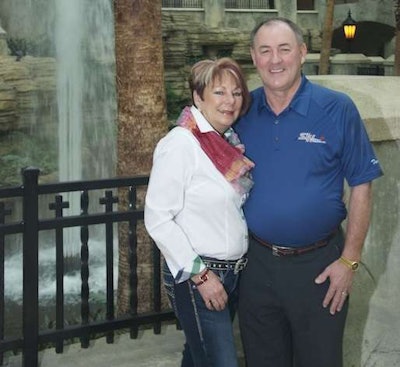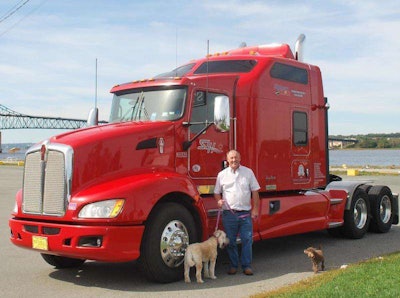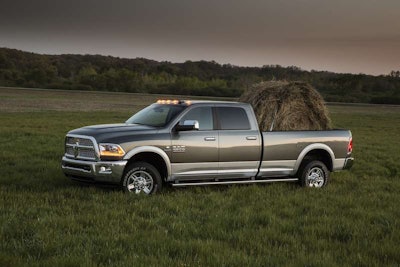 As one of three Owner-Operator of the Year finalists, Terry Smith and his wife Roxanne enjoyed an expense-paid trip to the plush Gaylord Texan, where he won a Ram 2500.
As one of three Owner-Operator of the Year finalists, Terry Smith and his wife Roxanne enjoyed an expense-paid trip to the plush Gaylord Texan, where he won a Ram 2500.Terry Smith of Miramichi, New Brunswick, has five rules for safety that have helped him to drive 4.75 million accident-free miles in his 42-year career. The fruits of his fifth rule, which impacts more than safety, helped him earn the industry’s top honor: 2013 Owner-Operator of the Year.
The award recognizes not just his stellar safety record, but also his involvement with trucking causes local and beyond.
Smith, who’s leased the last four years to Kingston, Ontario’s SLH Transport, received the award from the Truckload Carriers Association and Overdrive in March at TCA’s annual meeting near Dallas. He won a 2013 Ram 2500, sponsored by Chevron Delo and Cummins, and a year’s supply of Delo oil.
“Dispatch loves working with Terry,” says Bill Oakley, SLH operations manager. “He is a very easy-going professional individual who gets the job done safely. Terry is a mentor and spokesperson for the owner-operator group and voices collective opinions at our driver council meetings. He shares good ideas that help make SLH more operationally efficient and environmentally friendly.”
The morning after receiving his award at the plush Gaylord Texan in Grapevine, Texas, Smith elaborated on his fifth rule of safe driving: Don’t push yourself to run too many miles.

“When I was about 57 years old, my wife and I made the decision to stop chasing money, stop chasing miles, stop chasing to be rich,” says Smith, who’s now 62. He and Roxanne examined their financial status: no debt (including their home) and steady income. The typical driver mentality of “constant pressure” seemed to make less and less sense, he says: “You need to take the load, you need to run fast, work under conditions that are unsafe to you. We decided to back out.”
 “The love of my life is our dogs,” says Smith, shown here with Amber (the bigger dog), a Wheaten Terrier, and Schalin, a poodle. “My favorite country singer, who’s from Texas, is Amber Digby,” Smith says, and the breed is amber-colored, so their Wheaten Terrier is named after her. They’re getting another Wheaten Terrier in September. “My wife likes the name Shelby,” and Smith’s also a fan of country singer Shelby Lynne, so that will be the name of the new pet. “You know you’re a redneck when you name your dogs after country singers,” he says.
“The love of my life is our dogs,” says Smith, shown here with Amber (the bigger dog), a Wheaten Terrier, and Schalin, a poodle. “My favorite country singer, who’s from Texas, is Amber Digby,” Smith says, and the breed is amber-colored, so their Wheaten Terrier is named after her. They’re getting another Wheaten Terrier in September. “My wife likes the name Shelby,” and Smith’s also a fan of country singer Shelby Lynne, so that will be the name of the new pet. “You know you’re a redneck when you name your dogs after country singers,” he says.That still means putting in a full day’s work – he consistently drives 135,000 miles a year – but at a steady pace that allows good daily rest.
“I start in the morning at 7, driving, and I drive 600 miles a day,” Smith says. “I’m off the road by 7 p.m. So then I get parked, have time for a nice meal, a little walk if necessary.”
Drivers’ life expectancy is about 61 years old, he says, because too many are overweight, smoke too much and exercise too little.
“If you don’t have health, all this other stuff goes out the window,” Smith says. “Some people that can’t handle money can’t handle time. They go together. If you’re always rushing, you’re making mistakes. Sometimes you have to slow down.”
 Smith addressed hundreds of TCA members and affiliates when he accepted his award at the group’s annual meeting.
Smith addressed hundreds of TCA members and affiliates when he accepted his award at the group’s annual meeting.The lack of cash flow management is what destroys many owner-operators, he says, when they spend all of their revenue as it comes in instead of saving a big portion for expenses.
“You have to set a salary for yourself – 35 cents a mile or whatever you made at your former employer,” says Smith, who declined to state his net earnings. “Don’t rob your truck.”
Later, when those undisciplined owner-operators find themselves short on savings to cover major expenses, they start running too many miles.
|
Terry Smith’s 5 safety rules: 1 Never tailgate. 2 Never speed. His truck’s governed at 65 mph, but he normally drives at 60. “It’s safer, I don’t get speeding tickets, I get better fuel mileage, I’m not stressed,” he says. “People say you have to go fast to make money. I bought nine trucks by driving 60 mph.” 3 Think twice about changing lanes. “I ask myself, ‘Is this pass necessary?’ ” Often it’s not. 4 Try to let cars merge from entrance ramps. Too many four-wheelers are running late for work, drinking coffee, talking on a cell phone. Rather than risk an incident with a distracted driver, Smith slows down or, if possible, changes lanes to facilitate the merger. 5 Don’t push yourself to run too many miles. Get plenty of rest. |
Smith learned to manage an owner-operator business three decades ago when he became one, in 1982, after 10 years of driving for Canadian fleets.
“I started out with one used truck, a cabover Freightliner, and I’ve bought new trucks since,” he says. “I’m ready to order my 10th new truck. I trade every three years.” He’s now driving his second Kenworth, a 2011 T660 with an 86-inch studio sleeper, and his next truck also will be a Kenworth.
“I change my oil every 15,000 miles, and I have the truck greased and checked over every 7,500,” Smith says. “It’s a personal thing. It costs a little more money, but I try to keep on top of things.”
Smith hauls through all of Canada and the United States. Unknown to many people, the name of his fleet, SLH, stands for Sears Line Haul (or “Santa’s little helpers,” as drivers joke during the holidays, he says). SLH is owned by the big department store chain and moves some Sears freight for outlets or distribution centers, though it functions as a for-hire fleet.
SLH’s main freight is Michelin tires produced at three Nova Scotia plants. Most hauls are at least 1,000 miles, some up to 2,500 miles, into the states. “From the U.S., we reload into Canada whatever we can find,” mostly backhauling to Toronto or Montreal, and then home.
Smith is usually out eight to 10 days, covering 3,500 to 3,800 miles, and does a 36-hour Canadian reset on hours.
Roxanne, a retired teacher, has long been used to his schedule and has no problem with it. “It’s just like being single and you have a boyfriend,” she says. “We always have a date night when he comes home.”
They also set aside times for getting out of town: long weekends, Christmas and New Year’s, a late winter trip and the first week of July, when things slow down in the states due to the July 4 holiday and in Canada due to the July 1 Dominion Day.
 Smith won a 2013 Ram 2500, similar to this model, sponsored by Chevron Delo and Cummins. In addition to the Cummins-powered pickup, he won a year’s supply of Delo oil.
Smith won a 2013 Ram 2500, similar to this model, sponsored by Chevron Delo and Cummins. In addition to the Cummins-powered pickup, he won a year’s supply of Delo oil.Smith says they’ve taken some 10-day trips to places such as Mexico, Cuba and the Dominican Republic.
Getting his money and time under control has made those trips possible, but it’s also allowed Smith to devote time to others.
“If something comes up and involves trucking, they need a truck for an event, we try to help,” he says. He’s worked with Trucker Buddy, the program that facilitates pen-pal relationships between drivers and schoolchildren.
This year, Smith and Roxanne plan to represent SLH in working with another Canadian fleet, Bison Transport, and TCA to start Wreaths Across Canada. TCA has been successful with its Wreaths Across America program, in which fleets deliver wreaths to military cemeteries during the holiday season.
In a more personal situation, Smith organized a convoy to help raise support for a fellow driver and lifelong friend, the late Kim Lawlor, who was diagnosed with cancer. “We had 104 trucks show up, the largest gathering of trucks for this kind of event in Canada,” he says. “Thousands of people turned out to see it in the rain. It was miles of trucks. He was in the lead truck. He wasn’t able to drive.”
Downtime isn’t all volunteer work time, however. Though he’s home less than once a week and makes time with Roxanne a priority, Smith also attends meetings of Masons and Shriners, and he and Roxanne get together with friends inside and outside of trucking.
“A lot of friends of mine have restored cars,” he says. “We basically just go look at them, admire them. They’re a lot more fun to look at than to own.”
In 1998, he drove a school van to help his wife take 16 students to Florida for a math and science workshop. “He supports me as much as I support him,” Roxanne says. “We’re a team.”
– Kathleen Buccleugh contributed to this report.





